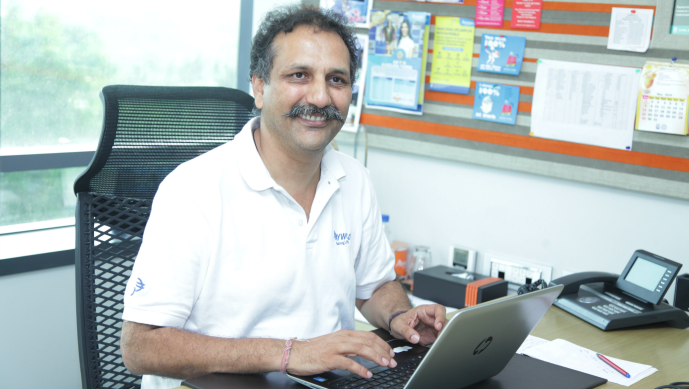Payworld is an aggregator of financial services, catering to the low-income market in urban India those from semi-urban and rural India

For over 50 percent of Indians living in abject poverty, digital transactions are a mirage. Majority of this population are uneducated or are still unaware of various digital facilities that could improve their lives. With most fintech companies — and even banks — catering to the urban population and the privileged section of the society, the chances for the upliftment of the poor are grim, at least in the short-term future.
A fintech company wants to reverse this trend.
“We understand that while living in a highly technological environment, we take for granted all the basic things we do using internet, such as recharging phone, buying online insurance, or money transfer. But if you look around, there are many people in India, who do not have the sufficient knowledge and learning to do it themselves,” says Praveen Dhabhai, COO of Payworld, which offers multi-modal payment solutions for different segments of the market. “We are targeting this population with our various fintech solutions.”
Payworld, an initiative by Sugal & Damani (a company that operates government-run lotteries across India), is an aggregator of financial services, catering to the low-income group in urban India and the people in semi-urban and rural India.
The firm aggregates financial services, such as the basic banking services like money remittance, SME lending, cash-out facility, loan repayment facility and utility bill payments, in addition to other digital services such as mobile recharging, bus/train/flight ticket booking, as well as insurance from various service providers. Payworld aggregates these services into one single platform and provides them to kirana stores (small, usually family-owned shop selling groceries and other sundries) and mobile shops. Retailers can then sell any of these services to people, who walk into their shop.
“Banks continue to follow traditional methods of distribution and found the delivery daunting. So, they prefer easy large-ticket lending. The inclusion of the last man in the pyramid — that vegetable vendor or the village tailor or the cycle repair mechanic — never happened. We aim to change this,” adds Dhabhai.
“We mainly cater to the migrant labour population, who need to send money back home, as well as people who don’t know how to use a debit card/internet banking to carry out transactions online. These solutions are also intended at people who don’t know how to buy a train ticket or purchase an insurance policy online. Surprisingly, nearly 93 percent of Indians fall under this category,” he adds.
Payworld’s mobile PoS devices are used by retailers to accept payments from their customers through credit/debit card for the goods/services sold to them. This device also works as mini ATM, which means anyone can withdraw up to INR 2,000 (US$31) from any partner retail outlet by swiping their debit/ATM card. This ultraportable device can be used to enable card acceptance at the customer’s doorstep as well.
Payworld Money is an central bank RBI-approved pre-paid instrument–digital/mobile wallet issuer, which has users doing primarily domestic money remittances through the assisted mode. Also, this wallet is accepted as payment options on many websites for recharges, remittances, e-shopping and bill payments.
It has also integrated its Aadhaar-enabled payment system with retail outlets, which allows the customer to withdraw cash, deposit cash, transfer and access bank statements without having to visit the branch.

Payworld COO Praveen Dhabhai
Thus far, the company has partnered with 100,000 retailer outlets in 630 districts in 23 federal states across India, and claims to be doing over 100 million transactions a year.
“The most common misconception about Payworld is that we are competing with digital wallet companies. This is in fact the complete opposite of what we are doing. We are focusing on people, who don’t have the bandwidth and knowledge to use a debit card/internet banking to fill money in his wallet and then do a transaction. We are targeting people who are otherwise difficult to reach out to,” he clarifies.
Starting with mobile recharge
When Payworld was conceived, the basic framework was developed around mobile recharging. At that time, retailers would use 10 different phones for 10 different service providers to offer mobile recharging services. Dhabhai and the team decided to bring all of these onto a single platform, thereby helping retailers save time and money.
“This became our USP. We then realised the value of aggregating services for the ease of use. So we didn’t stop at mobile recharge and we extended it to bill payments, and then kept adding new services as we moved forward,” he noted. “We developed a software that could do transactions even through a basic Nokia phone, which was more common amongst the store owners. When internet and hardware became ubiquitous, we developed a software that could be installed in these devices. Now, we have moved onto providing all sorts of financial services though a web portal and Android app.”
The company relies on a distribution model in tier II and III towns. It encourages distributors to find retailers in their area of strength and pay them commission on each transaction.
Payworld today has over 1,500 distributors across the country.
Also Read: (Exclusive) Creating Talks offers a platform for you to share your story with others, raises funding
According to Dhabhai, Payworld is growing at a 40 percent CAGR, with the FY2017-18 transaction volume standing at INR 2,300 crore (US$354).
A self-funded firm, the company is scouting for strategic partnerships and growth capital to add new services and also to take the business to the next level.
“Payworld services assume great significance against the backdrop of greater financial inclusion of the population, especially by reaching out to the unbanked for more and more cashless transactions. This will make the financial inclusion task easier for the government and users,” Dhabhai signs off.
—-
The post Payworld turns retail shops into ‘banks’ for low-income people to remit and withdraw cash, get micro-loans appeared first on e27.